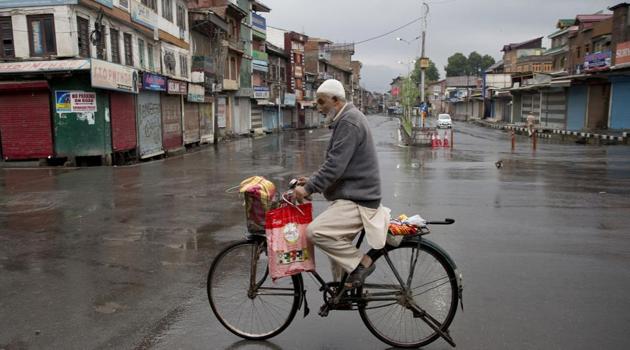Create a social contract between the State and its most alienated citizens
Modi must preserve the dignity of the ordinary Kashmiri. This is what he will be judged by.
Close to a month has passed since the Union government bifurcated Jammu and Kashmir and removed Article 370. What do the tea leaves say? Diplomatically, India has much to show for itself. While China and Pakistan responded with anger, most nations have been cautious. A fatigue with Kashmir as a global issue is apparent. The mixing of popular disaffection with Islamist currents and terror networks has contributed to this. As such, structured international opinion seems ready to give India room.

Such patience is not absolute. It is contingent on minimal violence, particularly if worsened by Indian security forces. Further, while it is accepted that a limiting of civil liberties and telecom services was inevitable in the immediate aftermath — to prevent instigation of violence — an early return to normality is essential. Admittedly “normality” is a contested expression in Kashmir; whatever it may mean, the release of detained politicians is a touchstone.
Given the relative absence of significant protests and violence — the biggest crowds, in Soura, are estimated at a manageable 4,000 strong — the government has survived a critical phase. Gradual easing of restrictions has begun. Yet there is much to do, and India cannot do it fast enough. For any democracy, civil liberties are not merely an external credibility test; they represent a commitment to cherished national principles.
What does the medium-term hold? Prime Minister Narendra Modi’s government has predicated its recent actions on a better deal for the Kashmir valley. Countering radicalism and terrorism are necessary here, but by themselves, not sufficient. What Modi will ultimately be judged by is his willingness to preserve and indeed enhance the ordinary Kashmiri’s dignity. This calls for a new social contract between the Indian State and its most alienated citizens.
The historically testy relationship between the Kashmir valley and the Indian State has been mediated by a political elite defined by clientelism. Over 70 years, New Delhi and its various arms (including intelligence agencies) have cultivated state governments and ruling cliques in Srinagar, as well as key opposition figures. For a certain sort of entrepreneurial Kashmiri, this has made politics not just an attractive option but pretty much the only game in town.
A February 2006 cable from the American embassy in New Delhi, republished by Wikileaks, told a sad story:
“Corruption cuts across party lines and most Kashmiris take it as an article of faith that politically-connected Kashmiris take money from both India and Pakistan … Money from Pakistani and Indian intelligence agencies and from Saudi and other foreign extremists has further distorted Kashmiri politics, incentivised leaders to perpetuate the conflict, and perverted state and Central government institutions. While this river of dirty money has led to a boom in Kashmiri household income and real estate prices, it also calls into question whether the Kashmiri elite truly want a settlement to their problems. The minute a deal is struck, some must surely worry that the funds will dry up.”
For common people — the proverbial silent majority or at least plurality, in the Modi government’s reckoning — this has meant little. Their aspirations have been overshadowed by excessive attention given to the 87 members of the legislative assembly. Could a deepening of democracy, and a widening of the stake in the Indian system, address this? In 2018, panchayat elections were held in the state for only the third time in 40 years. Subsequently, the Modi government promised devolution of welfare and developmental finances as well as delivery of economic projects and social programmes through 43,000 elected panchayat and municipal representatives.
The hope (or gamble) is there is latent demand for public goods and services in local communities, and for panchayat-level ownership of their delivery. Such demand perhaps coexists with, but is dwarfed by, larger questions of Kashmiri identity. This contention is supported by voting statistics. Forty-one per cent of all voters in the Kashmir valley participated in the 2018 panchayat election; voting in the 2019 national election was much lower.
Strengthened village and municipal democracy could raise administrative efficiency and empathy, and reduce corruption. It is nobody’s argument that these will repair the entirety of Kashmiri grievance. However, a new beginning may be worth the effort.
In 2004, in a thoughtful paper published by the United States Institute of Peace in Washington, DC, the respected civil servant Wajahat Habibullah outlined the political economy of Kashmir. “The Indian government,” he wrote, “generally funds 20% of the cost of state development, requiring the states to raise the remaining 80% themselves. From the 1950s until 1990, however, the state of Jammu and Kashmir enjoyed the reverse, receiving 80% of its funds in the form of a loan from the Central government. Since 1990, when the onset of the insurgency exacerbated the state’s financial problems, 100% of the state’s budget has been financed by the Central government, of which only 20% is repayable.”
Much of the money was embezzled, as Kashmir’s crisis became an industry. Habibullah movingly described how this troubled history had earned “for Kashmiris the contempt of both Indians and Pakistanis as a people who could be traded. For the Kashmiris, this practice only increased their sense of self-loathing and their resentment toward those in power”. The true measure of Modi’s new politics in Kashmir will be to what extent such “resentment” and “self-loathing” are replaced by a sense of dignity.



